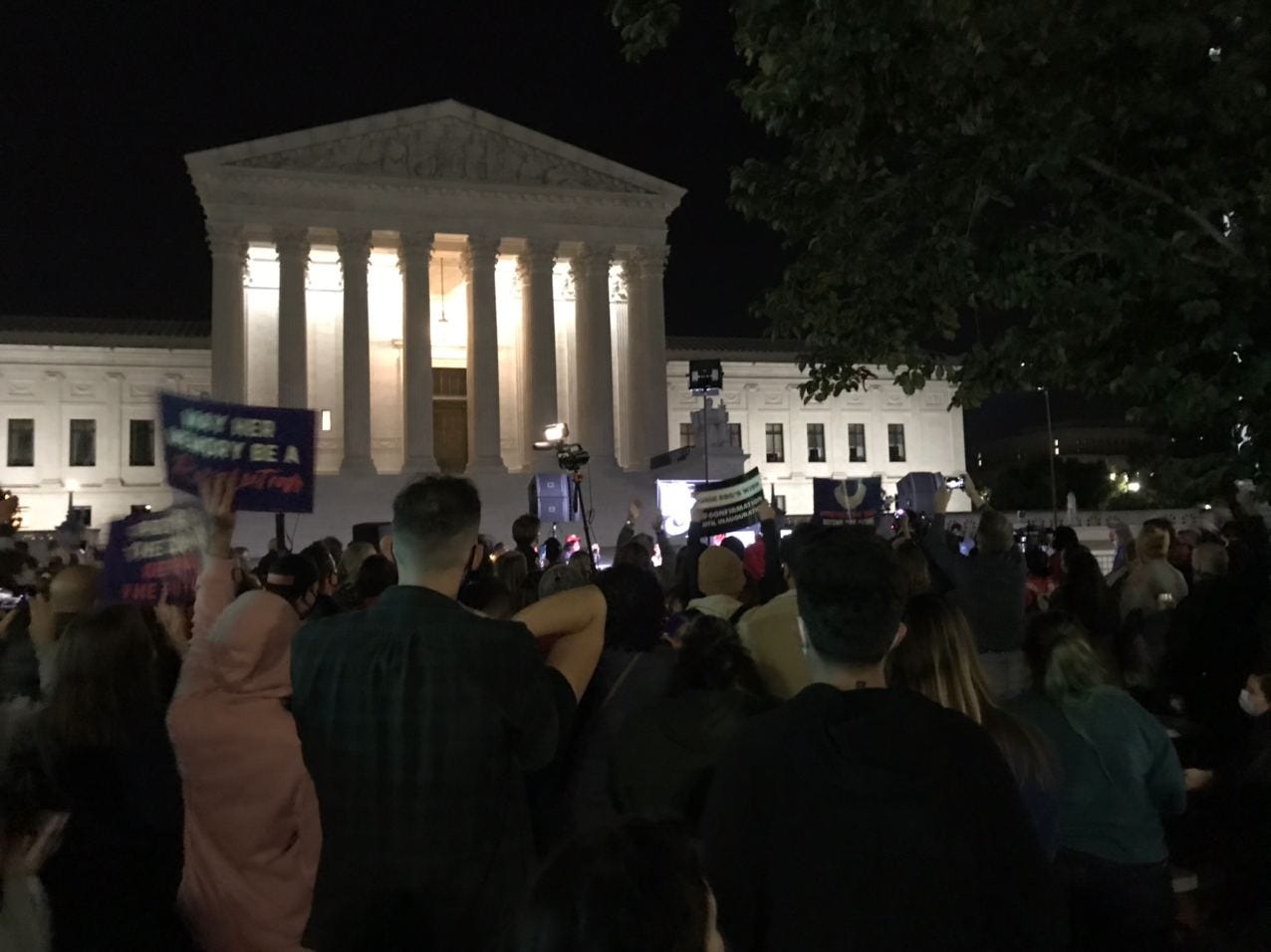Tyranny of the minority 📊 September 20, 2020
One political party can control the White House, Senate and Supreme Court with a significant minority of the vote
It doesn’t feel right to start this week’s email with a clever introduction.
As always, I invite you to drop me a line (or just respond to this email). Please click/tap the ❤️ beside my name if you like what you’re reading; it’s our little trick to sway Substack’s curation algorithm in our favor. If you want more content, I publish subscriber-only posts 1-2x a week.
Dear reader,
Below is a photograph that I took at the Supreme Court during a gathering (half political rally, half vigil) for Ruth Bader Ginsburg on the evening of Saturday, September 19th. The vacant seat Ginsburg leaves behind has the potential to the 2020 presidential and senate elections. If that happens, I imagine the demonstration I reported from will be the first of many to galvanize the left into seeing SCOTUS as a priority. Indeed, everyone in that crowd was looking to November with a fresh sense of urgency.

This week’s newsletter will be brief, but I wanted to touch on how Democrats are unlikely to get what they want from the Court in the long-term. Because of the way America’s electoral institutions are set up, they will have a hard time winning enough Senate seats to confirm a liberal justice — which, of course, also requires them to overcome the rural and Republican bent of the electoral college and win the presidency.
Ginsburg’s passing offers us a moment to pause and reflect on history’s long arc toward progress on gender equality and civil rights. It also offers us a chance to consider reform for some of the most anti-majoritarian electoral institutions of all western democracies.
—Elliott
Tyranny of the minority
One political party can control the White House, Senate and Supreme Court with a significant minority of the vote
I think that an impartial, independent and powerful judiciary is necessary to our government’s system of shared powers. Unfortunately, the Supreme Court is no longer impartial nor independent — it is only the latest casualty of mass factionalism and geographic political polarization.
Despite what the founders intended, the Supreme Court is now fully able to be controlled by a significant minority of the country’s voters. Of course, it is not a popularly-elected branch of government, but there are costs associated with minoritarian rule that transcend the original intent of the founders. The truth of SCOTUS today is that its justices are (1) nominated by an executive branch where Republicans can lose the national popular vote by five or six percentage points (according to some 2020 election forecasts) and still win the electoral college; and (2) confirmed by a Senate under nearly permanent Republican control except in the biggest of national landslides for Democrats. In terms of the 2016 election results, the median state (which would decide ties in the equally-apportioned senate) is eight percentage points more Republican than the nation as a whole. That means that if there were a single election for the Senate, Democrats would have to win the national vote by 8 points — or 10 million surplus voters — to control the majority.
While it is true that the founders tolerated an imbalanced distribution of power among the states (in terms of what their populations would have suggested), the imbalance today is many times larger. And anyway, we don’t have to accept our political reality just because James Madison said it was a “good” system.
Here’s how I see our country’s current predicament: so long as we have institutions that are even vulnerable to the scale of partisan malapportionment that we have today, then they are too corruptible to support. If we have plurality elections with geographic-based electoral institutions, our government will naturally tend to an imbalance of power that disadvantaged cities. In a country that values the principle that all voters should matter equally no matter where they happen to live, a republic where one party can get 47% of the two-party vote and control two and a half branches of government is no republic at all.
Many people have suggested adding Puerto Rico and DC as states to confer extra power in the Senate to Democrats. I think these quick fixes are more intended to make Democrats feel good than it is about solving the root ills of our government. I say this to make clear that I think the only way to fix our elections and Americans’ faith in their government is to scrap the equal representation of states in the Senate.
…
I am aware that many of you subscribe to my emails for data, not political theory. So I will abide by your request and submit some numbers:
First, Up until 1929, the size of the US House of Representative grew by roughly 30 seats each decade. Adding more seats now would do a great service toward making the House and electoral college more proportional.
And second, the Constitution was changed 27 times between 1787 and 1992, a rate of one every 8 years. That means we’re overdue for 3-4 additional amendments. In the ideal world, I think that ought to get the job done. (In reality, I think little at all will change in the short term.)
Posts for subscribers
September 15: Biases in political journalism and election forecasting. An aggressive pursuit of centrism will blind us to truths otherwise evident in the data
September 20: Are election forecasts bad for democracy? Maybe, but that obscures their value as tools for journalism
What I'm Reading and Working On
Jill Lepore has a very good book out this week entitled If Then: How the Simulmatics Corporation Invented the Future. It’s an engaging narrative history of the birth of modern quantitative social science.
Thanks for reading!
Thanks for reading. I’ll be back in your inbox next Sunday. In the meantime, follow me online or reach out via email if you’d like to engage. I’d love to hear from you.
If you want more content, I publish subscriber-only posts on Substack 1-3 times each week. Sign up today for $5/month (or $50/year) by clicking on the following button. Even if you don't want the extra posts, the funds go toward supporting the time spent writing this free, weekly letter. Your support makes this all possible!
Photo contest
Ian sends in this picture of Stella, his senior pup. “She's 11, has no teeth, and doesn't bark (ever).” A 10/10 heckin’ good doggo.

For next week’s contest, send me a photo of your pet(s) to elliott@gelliottmorris.com!




I would actually enjoy hearing more political theory. You ended abruptly thee and I would like to hear more what you have to say on solutions.